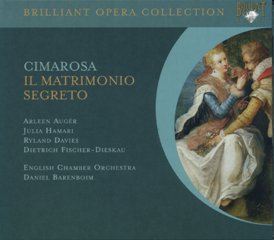Cimarosa – Il matrimonio segreto (Barenboim) [1976]
Cimarosa – Il matrimonio segreto (Barenboim) [1976]

1. Cara, Non Dubitar 2. Lusinga, No, Non C' E 3. Io Ti Lascio, Perche Uniti 4. Eccoche Qui Sen Vien 5. Orsu, Pui Non Si Tardi 6. Udite, Tutti Udite 7. Signora Sorellina, Ch'io Le Rammenti 8. Le Faccio Un Inchino 9. Chetatevi, E Scusatela 10. E Vero Che In Casa Io Son La Padrona 11. Prima Che Arrivi Il Conte 12. Senza Tante Cerimonie 13. Certo Sarete Stanco 14. Sento In Petto Un Freddo Gelo 15. Piu A Lungo La Scoperta 16. Carolina, Son Tutto Vostro - Brillar Mi Sento Il Core 17. Si, Coraggio Mi Faccio 18. Signor, Deh Concedete... 19. Oh, Carolina 20. Perdonate, Signor Mio 21. Tu Mi Dici Che Del Conte 22. Lasciatemi, Signore, Non State A Infastidirmi 23. Silenzio, Silenzio, Che Vien Mio Fratello 24. Orsu, Saper Conviene 25. Questa Invero E Curiosa 26. Se Fiato In Corpo Avete 27. Ecco Che Or Ora Scoppia 28. Sento, Ahime Che Mi Vien Male 29. Vanne, Vanne, La Seguita 30. Pria Che Spunti In Ciel L'aurora 31. Qua Nulla Si Conclude 32. Son Lunatico, Bilioso 33. Ebben- Sei Persuasa 34. Cosa Farete- Via, Su, Parlate 35. Dunque Andra In Un Ritiro 36. Come Tacerlo Poi, Se In Un Ritiro 37. Dove- Dove, Mia Cara 38. Deh Lasciate Ch'io Respiri 39. Sarete Or Persuasa 40. Se Son Vendicata 41. Il Parlar Di Carolina 42. Deh, Ti Conforta, O Cara 43. Sortite, Sortite 44. Carolina, Fuori, Fuori... 45. Ascoltate Un Uom Di Mondo Dietrich Fischer-Dieskau (baritone) – Geronimo, a wealthy merchant; Julia Varady (soprano) – Elisetta, his elder daughter, promised in marriage to the Count; Arleen Auger (soprano) – Carolina, his younger daughter, secretly married to Paolino; Julia Hamari (contralto) – Fidalma, Geronimo’s sister, widow; Alberto Rinaldi (baritone) – the Count; Ryland Davies (tenor) – Paolino, young clerk to Geronimo English Chamber Orchestra Daniel Barenboim - conductor
On Brilliant Classics 93962; 3 CD's; One of Barenboim's finest achievements is this recording, a set on which the singing is so gorgeous, that the listener is completely enraptured by the entire performance. Fischer-Dieskau and Varady play and sing their hearts out, while Auger's duets with Varady are among the most beautiful examples of buffa singing on record. The superb Ryland Davies, Alberto Rinaldi, and Julia Hamari make up the remainder of this outstanding cast on this outstanding recording. "Il Matrimonio Segreto" is a delightful opera which deserves to be much better known that it is. This set has been licensed by Brilliant Classics from Deutsche Grammophone for its Brilliant Opera Collection series. ---Editorial Review, amazon.com
Cimarosa already had strong ties to the Viennese imperial court, and when he arrived in the city in 1791 he quickly took a leading role. When Joseph II died, Salieri gave up his day to day duties in the opera house, and turned his attention to other forms of music. To help take up the slack, Cimarosa was appointed Kapellmeister, and Leopold quickly commissioned him to write a new opera for the court theater.
The piece he came up with was the comedy Il Matrimonio Segreto -- The Secret Marriage. The opera's story came from an English play by George Coleman and David Garrick, called The Clandestine Marriage, which premiered in 1766 at London's Drury Lane Theater, not far from today's Royal Opera House, Covent Garden.
The opera's libretto was written by Giovanni Bertati, whose rivalry with Mozart's famous librettist Lorenzo Da Ponte caused a bit of backbiting. Da Ponte praised Cimarosa's music for the opera, while declaring that opera's "words fell very far below expectations, and everyone is dissatisfied." But while Bertati's work on the whole may not have risen to the standards of Da Ponte's best efforts, The Secret Marriage was an undisputed hit, leaving the emperor satisfied enough that he ordered an immediate encore of the entire opera, after a quick break for dinner.
For the time being, Cimarosa rose to the top of the class in the unforgiving world of Viennese opera. Il Matrimonio Segreto was premiered at Vienna's Burgtheater in 1792. By 1800 the city had seen more than 70 performances of the score. Within two years of its premiere the opera had also been performed in cities all across Europe, including Leipzig, Paris, Florence and Lisbon, and by the early 19th century it had been translated into nearly a dozen languages. --- worldofopera.org
download: uploaded anonfiles yandex 4shared solidfiles mega filecloud
Last Updated (Wednesday, 09 October 2013 15:46)








